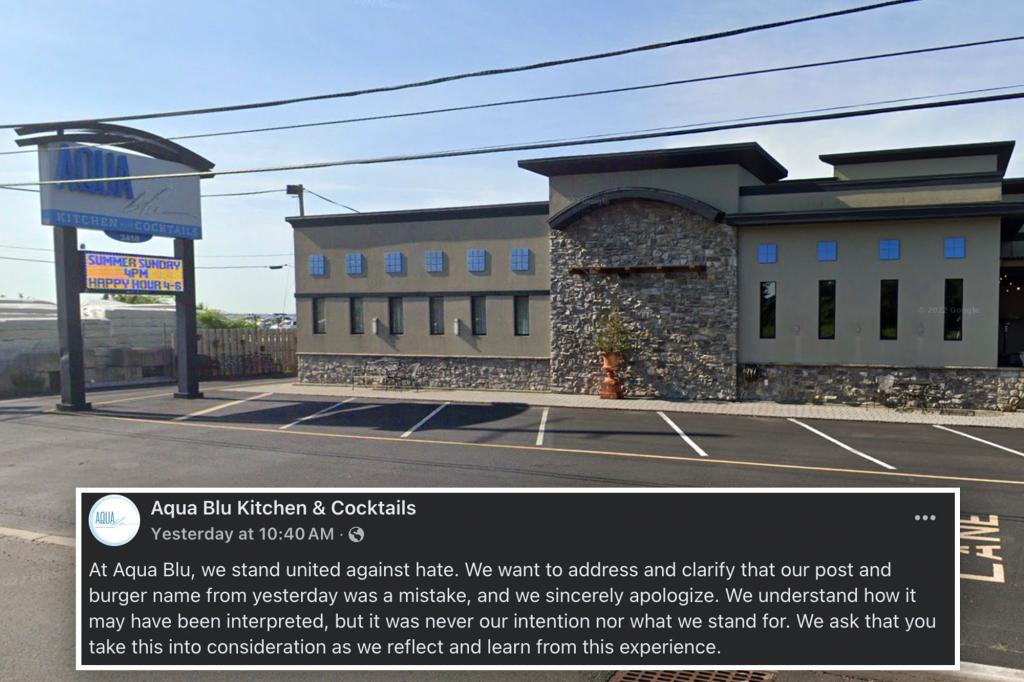The Aqua Blu Kitchen & Cocktails restaurant in New Jersey found itself embroiled in controversy after introducing a burger named after the far-right group, the Proud Boys. The “Proud Boys Burger,” with its ingredients listed as “white American cheese,” “layers of truth,” “cancel culture coleslaw,” and “liberty sauce,” sparked immediate outrage online when a customer shared a photo of the menu. Restaurant owner Cathy Varriale quickly attempted damage control, claiming ignorance of the Proud Boys’ true nature and attributing the burger’s creation to one of her chefs. She stated that she interpreted the name innocently and had not intended to endorse the group’s ideology. This explanation, however, did little to quell the online firestorm.
Varriale’s claim of ignorance, particularly given the highly publicized nature of the Proud Boys and their activities, was met with skepticism. Her attempts to distance herself and the restaurant from the group’s ideology were further complicated by the burger’s overtly political ingredient descriptions, which appeared to echo far-right rhetoric. The incident highlighted the risks businesses face when venturing into politically charged territory, particularly when lacking a thorough understanding of the implications. The seemingly careless use of loaded terms like “cancel culture” and “liberty,” commonly associated with conservative and far-right discourse, further fueled the perception that the restaurant was intentionally aligning itself with the Proud Boys’ ideology.
Adding to the controversy was the restaurant’s history of offering politically themed burgers, including a “Sleepy Joe” and a “Trump Burger.” While these previous offerings might be seen as attempts at playful political commentary, the “Proud Boys Burger” incident crossed a line for many due to the group’s association with violence and hate speech. Varriale’s explanation that the “Proud Boys Burger” was part of a weekly tradition of themed burgers based on staff families raised further questions. The claim that the burger was inspired by a staff member’s family, and not a deliberate homage to the group, struggled to gain traction amidst the mounting criticism.
The backlash against Aqua Blu was swift and severe. Varriale reported receiving a deluge of angry messages and threats of protests, highlighting the intense emotions surrounding the Proud Boys and their association with extremism. The restaurant’s social media pages were inundated with negative comments, and many former patrons vowed to boycott the establishment. The incident underscored the power of social media in amplifying controversies and holding businesses accountable for perceived missteps. The rapid spread of the menu photo and the subsequent online outrage demonstrated the potential for significant reputational damage in the digital age.
Varriale’s attempts to rectify the situation included deleting the Facebook post advertising the burger, reprinting menus without it, and issuing a public apology. She expressed remorse for the incident, stating that it was a result of “stupidity” and “ignorance,” and reiterated that the restaurant did not support hatred or Nazism. However, the apology was met with mixed reactions, with some questioning its sincerity and others criticizing the restaurant for not taking more proactive steps to address the underlying issues. The incident served as a stark reminder of the challenges of repairing damaged public trust, particularly when the offense is perceived as aligning with harmful ideologies.
The “Proud Boys Burger” incident occurred against a backdrop of heightened political tensions and increased scrutiny of extremist groups. The timing of the controversy, shortly after former President Trump’s pardon of Proud Boys leader Enrique Tarrio, further amplified the public outcry. Tarrio’s conviction for his role in the January 6th Capitol riot, and his subsequent pardon, brought the Proud Boys back into the national spotlight. The restaurant’s ill-conceived burger inadvertently became a flashpoint in the ongoing debate about extremism, free speech, and the responsibilities of businesses in navigating a polarized political landscape. The controversy underscored the importance of careful consideration and sensitivity when dealing with potentially divisive topics, particularly those with connections to hate groups and violence.










